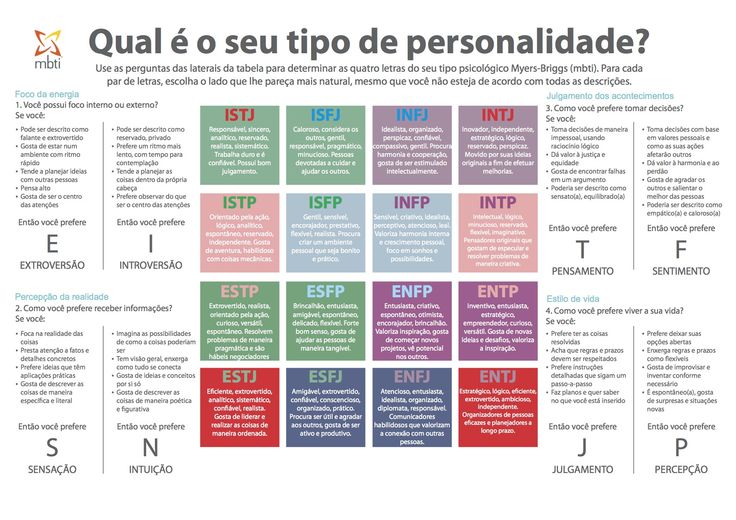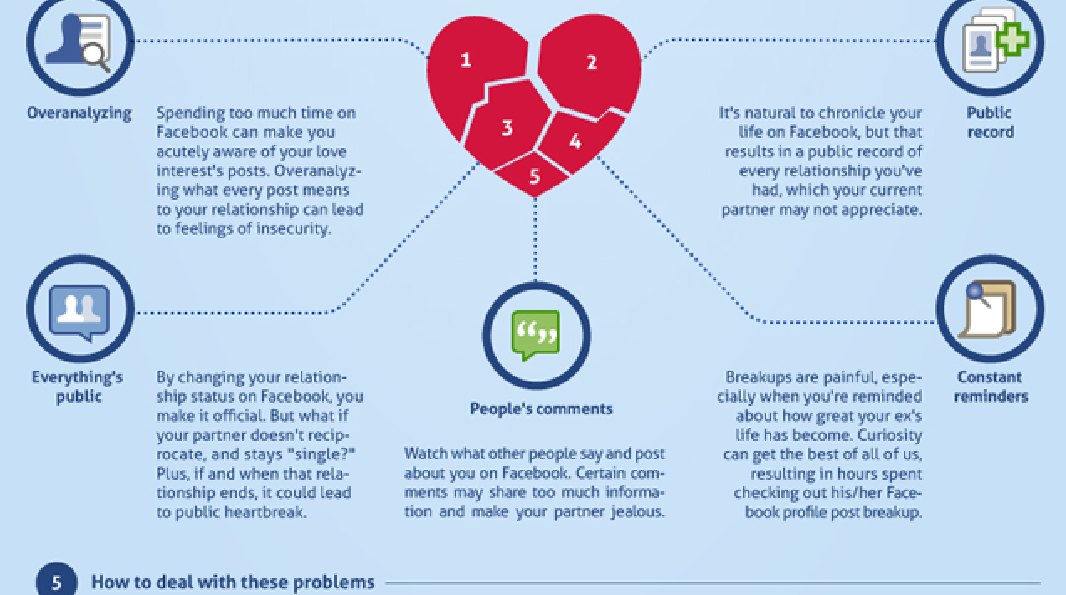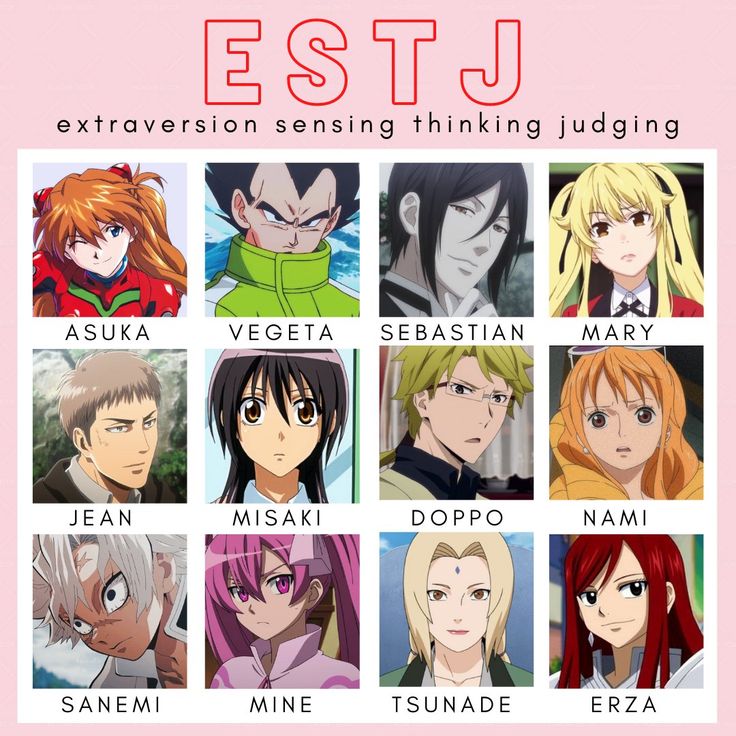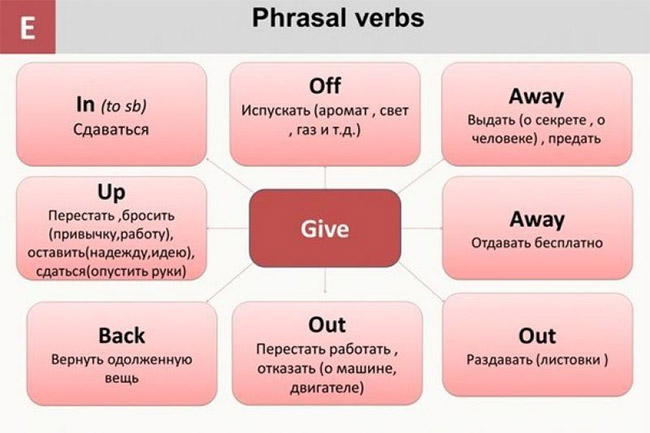What is the least common myers briggs personality type
What is the least common Myers-Briggs personality type?
Posted 07 August 2017 by
Melissa, MBTI Marketing Manager
There’s no wrong personality type, but there is certainly a least common Myers-Briggs personality type. We looked at a sample of the US population from three different organizations to determine what the least common Myers-Briggs personality types are for men and women and talk a little about why the population isn’t just split evenly among the 16 types. So, what is the least common Myers-Briggs personality type for men and women?
First, what is a sample? A sample is a select group of units (people who’ve taken the official MBTI assessment) from a population (United States) that by studying this group we may fairly generalize our results back to the population.
The numbers we’re sharing below come from three validated sources for Myers-Briggs personality types. The first is the Center for Applications of Psychological Type (CAPT), and they have a sample size (the group you’re adding together) of about 900,000 people over the past 20 years. The second source is The Myers-Briggs Company, the official publisher of the Myers-Briggs assessment, that lists a national representative sample of about 5,000 people, and the last group comes from the Stanford Research Institute (SRI) contributing about 1,000 people. It’s important to keep in mind that these people have taken the actual MBTI assessment and their types have been verified (aka they didn’t take a knock-off quiz just for fun). Also, these numbers are for the United States only, not samples of type across the globe.
So, what is the least common Myers-Briggs personality type?
The least common Myers-Briggs personality Type is INFJ
People who prefer INFJ make up only 1.5% of the general population in the US. There are only slightly more female INFJs than male INFJs though, with 1.6% of the women in the US having this preference and only 1.3% of the men in the US population having this preference.
The second most rare Myers-Briggs personality type is ENTJ
Those who have preferences for ENTJ are the second most rare Myers-Briggs personality type in the US.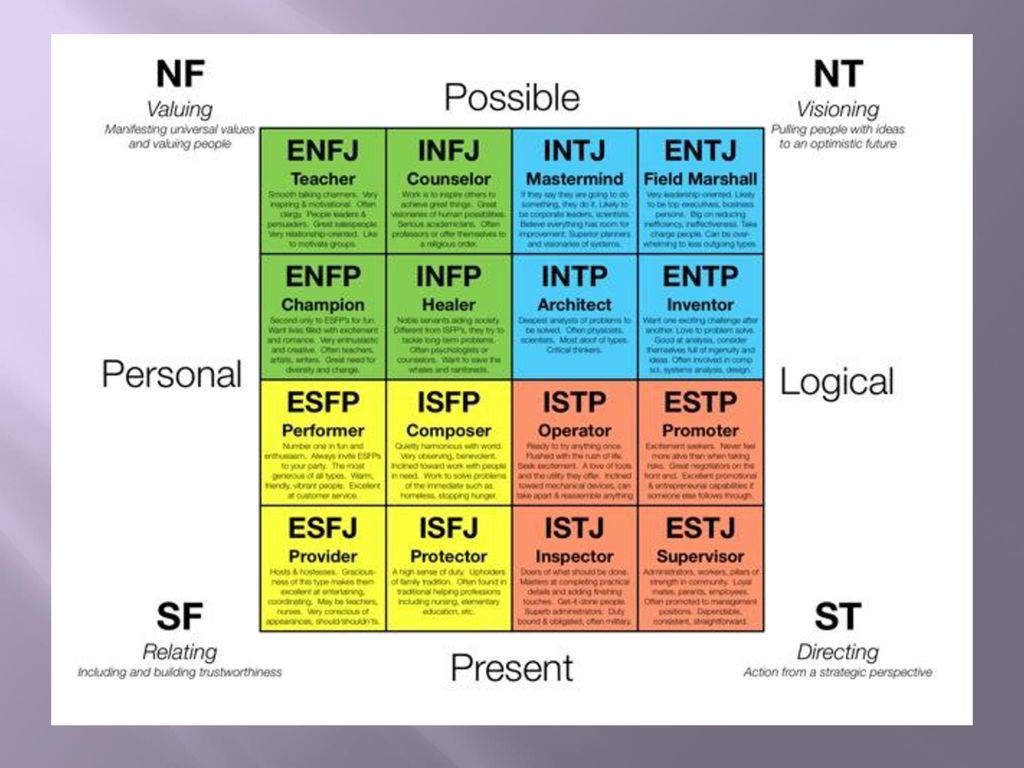 With only 1.8% of the total population having preferences for ENTJ, it’s easy to feel misunderstood if you have these preferences. However you have a little more company if you’re a man with ENTJ preferences, as they make up 2.7% of the population while women with ENTJ preferences only account for 0.9% of the population.
With only 1.8% of the total population having preferences for ENTJ, it’s easy to feel misunderstood if you have these preferences. However you have a little more company if you’re a man with ENTJ preferences, as they make up 2.7% of the population while women with ENTJ preferences only account for 0.9% of the population.
The third most rare Myers-Briggs personality type is INTJ
People who prefer INTJ make up 2.1% of the population. Among men, this type is a little more common with 3.3% of the population. Women, however, only make up 0.8% of the population for INTJs.
ENTJ (0.9%) and INTJ (0.8%) are the least common MBTI personality types for women.
Among men in the US, INFJ (1.3%) and ENFJ (1.6%) are the least common MBTI personality types.
Why is INFJ the most rare personality type?
Asking why INFJ is the least common Myers-Briggs personality type is kind of like asking “why are we here on this planet” or “why do some people prefer ice cream to potato chips.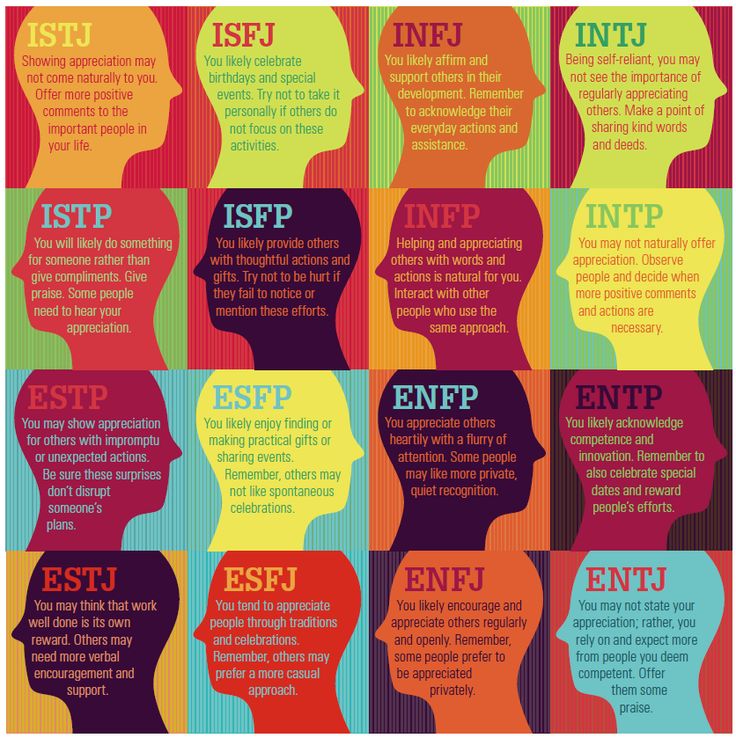 ” Remember that these are natural preferences, or inborn preferences, so as far as the population goes there are just less people born with this combination of preferences.
” Remember that these are natural preferences, or inborn preferences, so as far as the population goes there are just less people born with this combination of preferences.
In addition, American culture favors preferences for ESTJ. You’ve probably heard or experienced that American culture (among others around the world) favors behaviors associated with the preference for Extraversion – things like brainstorming sessions, networking, group activities, even happy hours. The same is true for preferences for Sensing, Thinking and Judging, which is why at times if you have the opposite preference of those listed, you can feel like the world is pushing back against you at times. Regardless of how rare or common one personality type is though, the important thing is that you know how your specific preferences can help you and how can they not in the environment that you’re in.
If you want to see the type table with all 16 MBTI personality types and what percentage of the US they make up for men, women and both, take a look at the PDF from CAPT.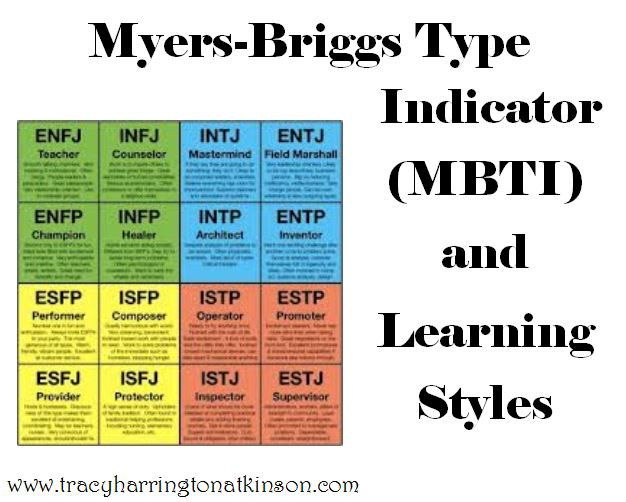
How Rare Is Your Myers-Briggs® Personality Type?
“What is the rarest Myers-Briggs type?”
“What is the most common MBTI® type?”
These are questions I get asked daily as an MBTI® practitioner. The answers can be confusing, because statistics and surveys change from year to year. Plus many people feel that being rare is the equivalent of being “best.” Today we’re going to take a look at the rarest MBTI® (Myers-Briggs) personality types as taken from a national sample of 16,773 individuals from 23 different countries. For more information on this national sample, you’ll need to pick up a copy of the MBTI® Manual – Fourth Edition.
We’re ranking the 16 personality type from rarest to most common, but this article is by no means saying any personality types are better than others.
“But my personality type is common and I still feel misunderstood!”
Having a common personality type doesn’t mean that you will automatically fit in and feel deeply understood.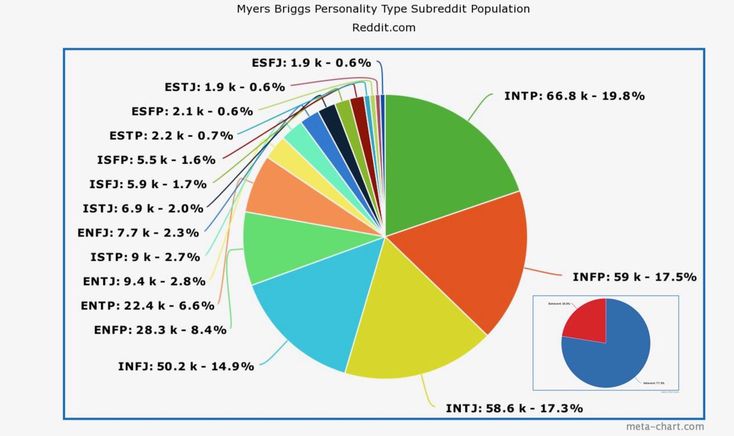 Even the most common personality type only makes up 15.9% of the global sample that was used for the survey! This means that regardless of your type there’s a good chance that you feel misunderstood.
Even the most common personality type only makes up 15.9% of the global sample that was used for the survey! This means that regardless of your type there’s a good chance that you feel misunderstood.
Not sure what your personality type is? Take our new personality questionnaire!
This article has been extremely controversial and the source of many angry comments and emails since I published it. All the data in this article is taken from the newest official MBTI® Manual. The results were taken from a sample of 16,773 individuals from 23 different countries. I am not concocting this information but getting it directly from The Myers-Briggs Company itself.
Table of contents
- Before You Write That Angry Comment…
- The Rarest Male MBTI® Type
- The Rarest Female MBTI® Type
- The Rarest to Most Common Myers-Briggs® Types
- The ENTJ – The Rarest MBTI Type
- The ENFJ – The Second Rarest MBTI Type
- The INFJ – The Third Rarest MBTI Type
- The INTJ – Fourth Rarest MBTI Type
- The ENTP – 4.
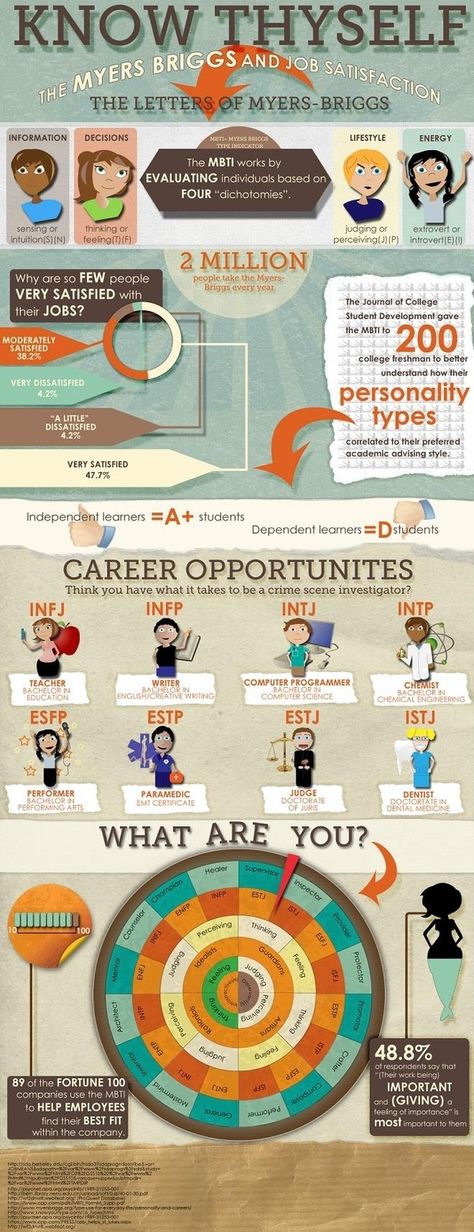 3% of the National Sample
3% of the National Sample - The INTP – 4.8% of the National Sample
- The ESFJ – 5.7% of the National Sample
- The ESFP – 6% of the National Sample
- The ESTP – 6.1% of the National Sample
- The INFP – 6.3% of the National Sample
- The ISFP – 6.6% of the National Sample
- The ENFP – 8.2% of the National Sample
- The ISFJ – 8.4% of the National Sample
- The ESTJ – 9% of the National Sample
- The ISTP – 9.8% of the National Sample
- The ISTJ – 15.9% of the National Sample
It’s a Tie! INFJs and ENFJs are the Rarest Male Personality Types
Men who value Intuition, Feeling, and Judging only make up 2.8% of the male population combined! Insightful and empathetic, these types have a desire to draw their communities towards progress and change. Because of their future-oriented, abstract focus, they aim to motivate people towards a vision or picture of how they want the future to be. They have a knack for understanding how to move people on an emotional level.
They have a knack for understanding how to move people on an emotional level.
You can find out more about these two personality types here: 10 Talents of the INFJ and ENFJ Personality Types
The Rarest Female MBTI® TypeThe ENTJ
Female ENTJs make up only 1.5% of the female population. These ambitious types are known for their bold, strategic nature and their ability to bring people on board for their vision. Decisive and insightful, they tend to pioneer new paths in technology and business. In fact, this type is also the highest-earning personality type!
The Rarest to Most Common Myers-Briggs® TypesThe ENTJ – The Rarest MBTI TypeMaking up a mere 1.8% of the population, ENTJs are the rarest of all the 16 personality types. However, these types don’t usually mind being rare – in fact, they tend to like it! As independent achievers, they don’t feel a compulsion to “fit in” as many other types do. They value intelligence and competence and are forceful in applying themselves towards their revolutionary goals.
They value intelligence and competence and are forceful in applying themselves towards their revolutionary goals.
ENFJs are the second-rarest personality type, making up only 2.2% of the population. These insightful, compelling types tend to know just the right buttons to push to motivate people towards their goals. Because they are so passionate and understanding, ENFJs have a gift for motivating people towards personal growth. They are usually very directive and decisive in achieving goals that they feel are best for communities as a whole.
The INFJ – The Third Rarest MBTI TypeThe INFJ personality long been touted as the rarest personality type of all, even by me! However, over the last decade, they have become slightly less rare and now make up 2.3% of the population. INFJs are the “Mystics” of the Myers-Briggs system and have a gift for anticipating future implications. They are primarily focused on the big picture and they tend to have an eye towards long-range plans and less of a focus on day-to-day details.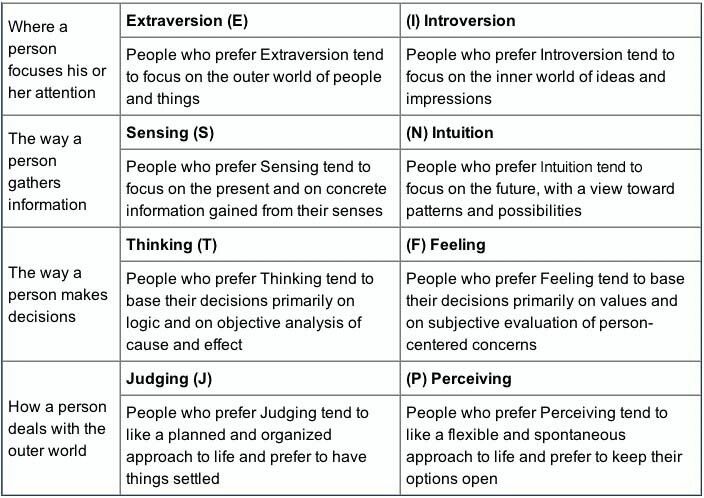 These types are deeply in-tune with patterns, symbols, and abstract possibilities. Typically caring and compassionate, they have a knack for understanding human motivations.
These types are deeply in-tune with patterns, symbols, and abstract possibilities. Typically caring and compassionate, they have a knack for understanding human motivations.
Intellectual, creative, and strategic – the INTJ is the second-rarest female personality type and the fourth-rarest male personality type. These individuals are driven to understand the deeper meaning behind what happens in life. It’s as if they want to grasp the “dance of the universe” and see more deeply into situations and events than most people ever consider in their lifetime. They naturally synthesize complex theoretical matters to devise strategies and develop visionary objectives.
The ENTP – 4.3% of the National SampleAs the fifth-rarest personality type, ENTPs are known for their innovative, imaginative approach to life. Because they are drawn towards novelty and transformation, ENTPs are the quintessential “idea-people” of the world.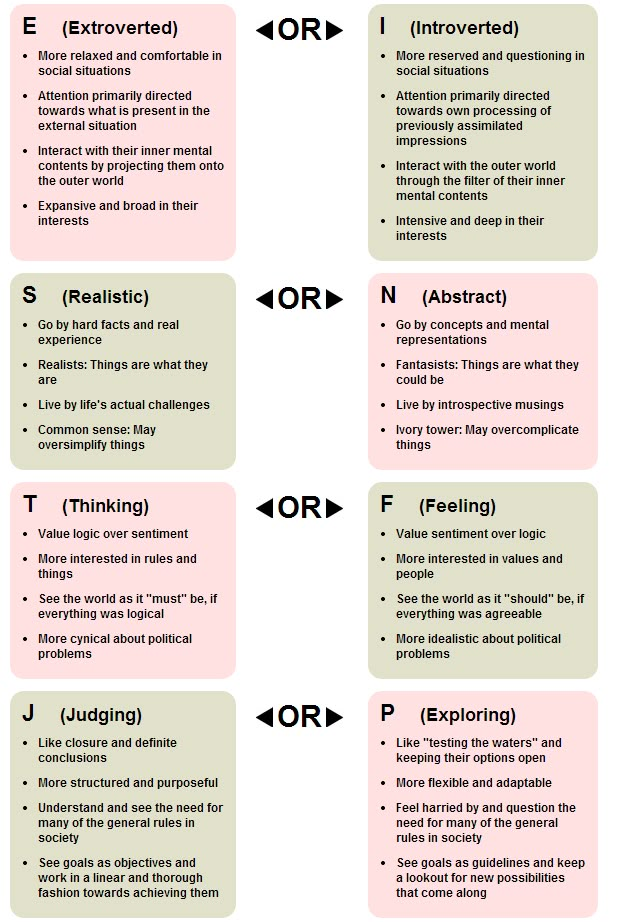 Quick, ingenious, and charismatic, they are adept at generating possibilities and analyzing them in a strategic way.
Quick, ingenious, and charismatic, they are adept at generating possibilities and analyzing them in a strategic way.
Quiet and reflective, INTPs have a desire to understand the logical explanation for everything that happens. Because these types are so deeply analytical, they have a unique ability to focus in-depth on a problem in order to solve it. They rarely get impatient when problem-solving, unless they are pressured or micro-managed by others (which they hate). They are typically skeptical, curious, and creative.
The ESFJ – 5.7% of the National SampleThe rarity of ESFJs surprised me because they were ranked as the 2nd most common personality type in results from 1972-2002. I don’t know why this type has become rarer, but it’s an interesting new development! ESFJs are the warm-hearted, conscientious centers of most communities. These types work with determination to create a harmonious, fair world.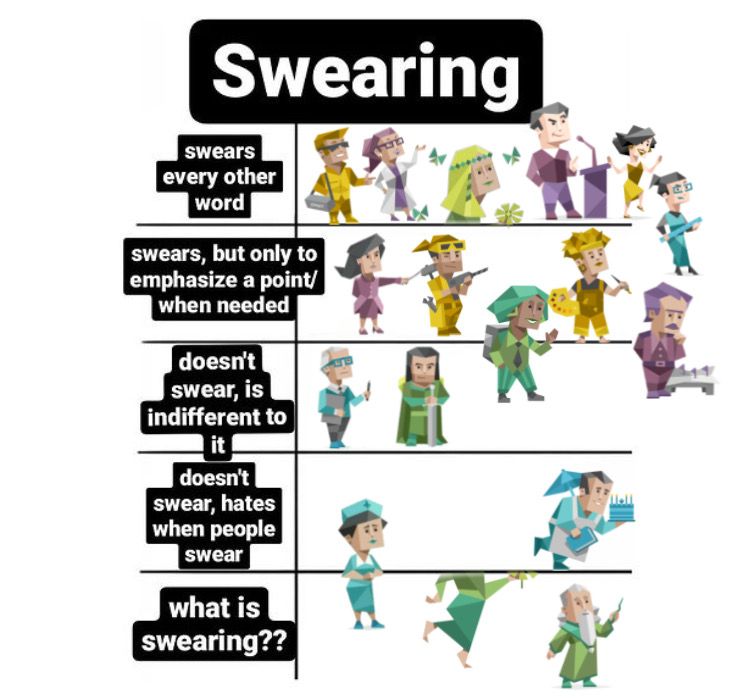 They are typically pragmatic, loyal, and supportive and contribute a great deal to the causes they believe in.
They are typically pragmatic, loyal, and supportive and contribute a great deal to the causes they believe in.
Outgoing, charismatic, and friendly – ESFPs have a zest for life that is nearly unmatched. These adventurous souls aim to live each day to its fullest potential and approach work, life, and family with a sense of fun. Flexible and spontaneous, ESFPs adapt quickly to new people and environments.
The ESTP – 6.1% of the National SampleRealistic and action-oriented – ESTPs focus on enjoying life and solving real-world, immediate problems. These spontaneous, adventurous types enjoy taking smart risks and often pursue entrepreneurial careers or ventures in the stock market or law enforcement. They enjoy thinking on their feet and having an active, fast-paced life.
The INFP – 6.3% of the National SampleIdealistic, compassionate, and creative – INFPs are often the artists, authors, and background helpers of the world.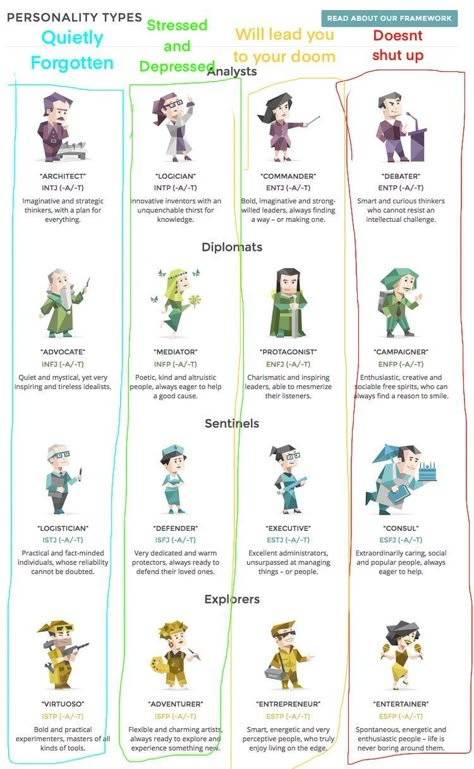 They are usually quick to see possibilities and potential in people and themselves. They usually appear flexible on the outside but inwardly are very committed to their values and beliefs.
They are usually quick to see possibilities and potential in people and themselves. They usually appear flexible on the outside but inwardly are very committed to their values and beliefs.
Sensitive but pragmatic – ISFPs are passionately loyal to the values that are important to them. They have a free-spirited, inquisitive approach to life and tend to enjoy traveling, creating, and spending time in nature. These types want to make a hands-on difference in the lives of others and are over-represented in health-care and emergency service industries as a result.
The ENFP – 8.2% of the National SampleCompassionate and charismatic – ENFPs see life as full of possibilities and potential. They quickly make connections between events and information and make decisions based on the patterns they see. These types readily give support and reassurance to others and have a flexible, spontaneous approach to life.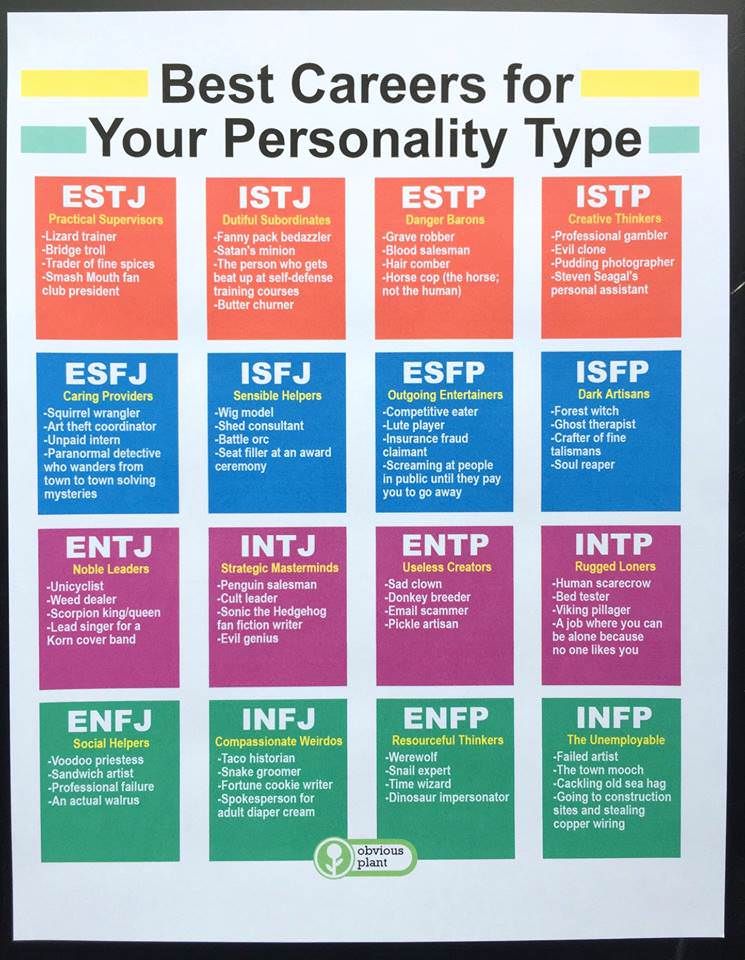
Supportive and loyal, ISFJs are often the good Samaritans of the type community. These types believe in nurturing their communities and preserving the details and traditions that give life a sense of beauty and meaning. They are usually considerate, responsible, and conscientious.
The ESTJ – 9% of the National SampleDetermined, practical, and matter-of-fact – ESTJs move through life with a desire to organize everything for maximum efficiency. These types focus on getting results without expending a lot of unnecessary energy. They have an eye for details and a clear set of logical standards they adhere to. They are usually very ambitious and determined in implementing their plans.
The ISTP – 9.8% of the National SampleAdventurous and analytical, ISTPs are able to find solutions quickly in make-or-break situations. They enjoy gathering information and using it in a hands-on way in the real world.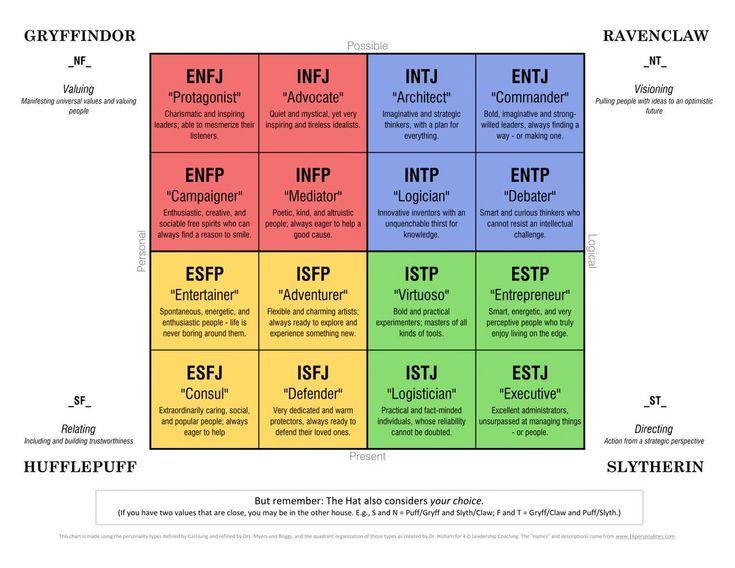 Autonomous and often mysterious, these types are highly observant to their surroundings and quickly find opportunities and resources that can be used to aid them in their goals.
Autonomous and often mysterious, these types are highly observant to their surroundings and quickly find opportunities and resources that can be used to aid them in their goals.
As the most common personality type, ISTJs are the foundation of many communities and workplaces around the world. These types are highly detail-oriented, pragmatic, and grounded. Because they are so detail-oriented and dependable, they are prized in the workforce and are often over-represented in careers like accounting and law enforcement. ISTJs strive to be reasonable in their decisions and value common sense and wisdom gained by experience. Because of this, they are usually quick to decide logically how to handle situations. They usually work towards goals steadily, regardless of roadblocks or distractions. It’s important for them to make the world a more organized, sensible, and effective. It’s a good thing we have so many of these types in the world!
Source:
MBTI® Manual – Fourth Edition
What Do You Think?
Did you enjoy this article? Did you feel like your personality traits are rare? Remember that type rarity doesn’t equal type superiority.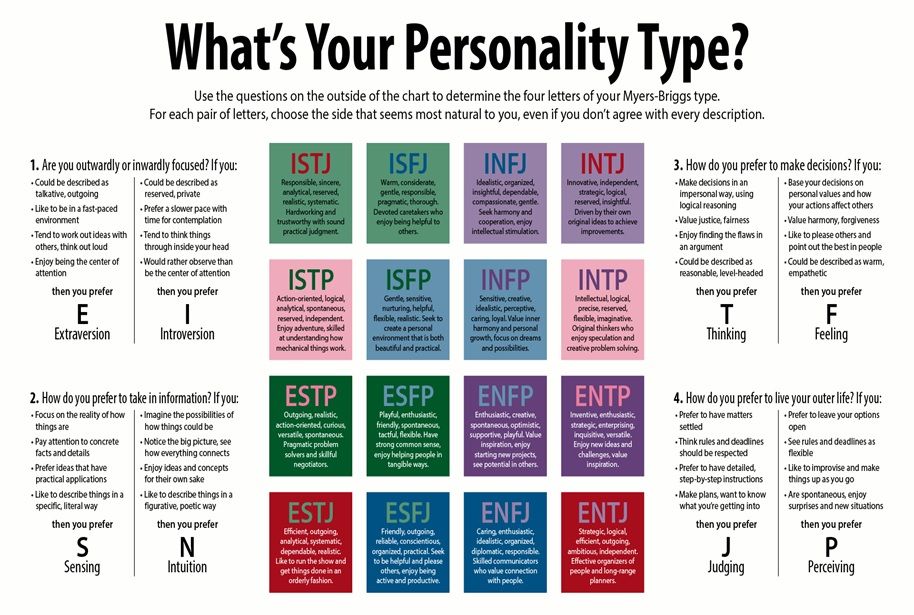 Too many people let themselves think that! Each individual is completely unique, regardless of how rare or common their personality type is. Let us know in the comments!
Too many people let themselves think that! Each individual is completely unique, regardless of how rare or common their personality type is. Let us know in the comments!
Find out more about your personality type in our eBooks, Discovering You: Unlocking the Power of Personality Type, The INFJ – Understanding the Mystic, and The INFP – Understanding the Dreamer. You can also connect with me via Facebook, Instagram, or Twitter!
Other Articles You Might Enjoy:
The Lovable Quirks of Every Myers-Briggs® Personality Type
The Obnoxious Versions of Every Myers-Briggs® Personality Type
Here’s Which Personality Types Read the Most Books
Sources:
The MBTI® Manual – Fourth Edition
- More
ENFJ, ENFP, ENTJ, ENTP, ESFJ, ESFP, ESTJ, ESTP, INFJ, INFP, INTJ, INTP, ISFJ, ISFP, ISTJ, ISTP, MBTI, Myers Briggs
The world's 5 rarest personality types according to the Myers-Briggs typology
Trending
When you hear the word "rare", you most likely imagine someone close to you who is really special to you .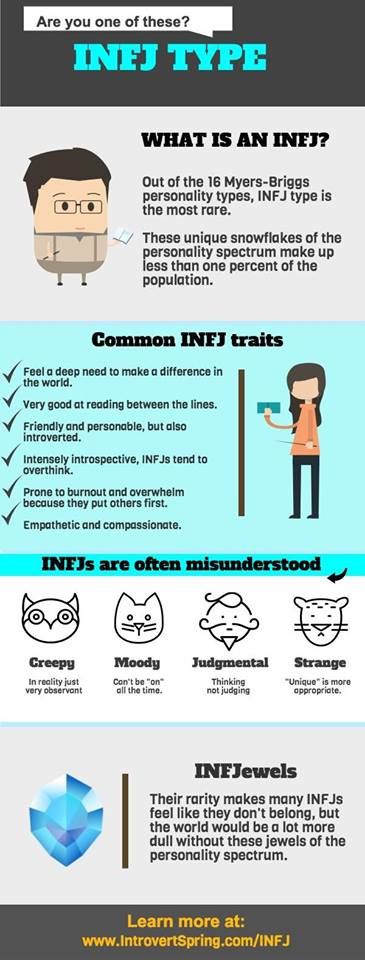 Maybe this is your best friend or relative - or maybe you yourself. You know who I'm talking about, people who don't look like anyone else, like they're made of a different fabric. Maybe this unique person has one of the 5 rare personality types , which I will tell you about today!
Maybe this is your best friend or relative - or maybe you yourself. You know who I'm talking about, people who don't look like anyone else, like they're made of a different fabric. Maybe this unique person has one of the 5 rare personality types , which I will tell you about today!
By the way, let me remind you how to "read" the name of personality types in MBTI. In general, the type is calculated based on what you like or dislike, what you are strong in and what you are a little weak in. Tests are aimed at calculating what you are more inclined towards: extraversion (E) or introversion (I) ; sensory (S) or intuition (N) ; think more (T) or feel (F) ; condemn (J) or perceive (P) .
In total, the Myers-Briggs typology identifies 16 personalities whose names are combined from the letters and their meanings above.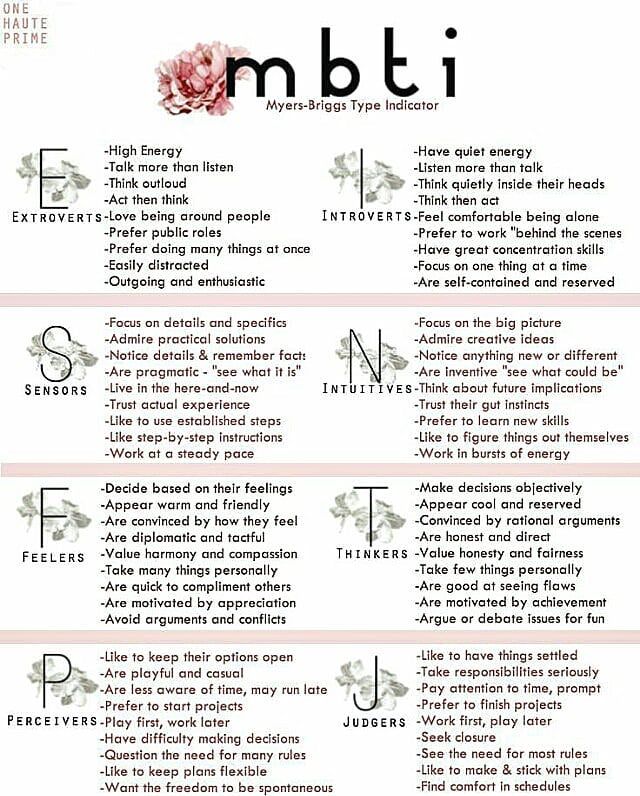 There are some especially rare in these 16 types, which even in Russia and in the world are quite rare. Well, are you ready to look for something special in yourself and others?
There are some especially rare in these 16 types, which even in Russia and in the world are quite rare. Well, are you ready to look for something special in yourself and others?
ENFJ - "Coach"
🌍 How much in the world: 2.5%
⭐ How much in Russia: 4.77%
Top 3 countries with the most Coaches: Gibraltar (9.40%), Lebanon (9.09%), Fiji (8.94%).
Top 3 countries with the least number of Coaches: Myanmar (Burma) (4.52%), Singapore (4.52%), Latvia (4.61%).
People who are extroverted, intuitive, sensory and rational tend to be a bit unusual and stand out from the crowd. Coaches intuitively feel people, even without words. But what really sets them apart is the use of their empathy. If INFJs use it for the benefit of others, then ENFJs do it and use their abilities for themselves.
Yes, they are happy to help, sincerely, but the Coaches will not forget about themselves.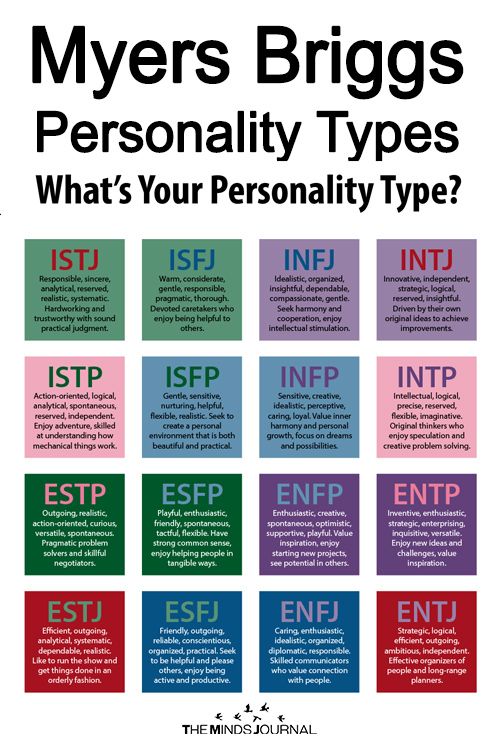 Their charisma and obsession with what they love never go unnoticed, sometimes they can even seem like fanatics. But what really sets ENFJs apart from other types is their special ability to see potential in other people . And, which is also cool, to inspire them and help them achieve their goals.
Their charisma and obsession with what they love never go unnoticed, sometimes they can even seem like fanatics. But what really sets ENFJs apart from other types is their special ability to see potential in other people . And, which is also cool, to inspire them and help them achieve their goals.
ENTJ - "Commander"
🌍 How many in the world: 2%
⭐ How many in Russia: 4.47%
Armenia (6.90%).
Top 3 countries with the least number of Commanders: Brunei (1.18%), Singapore (1.26%), Faroe Islands (1.28%).
This personality type is distinguished from ENFJ by a special combination of intuition and extraversion. Last Commanders use first, support first. ENTJs are great at networking and meeting new people, combining friendliness and sociability with a rich inner world. At the same time, Commanders also have negative traits, such as a tendency to blame other people for their failures or to be impatient.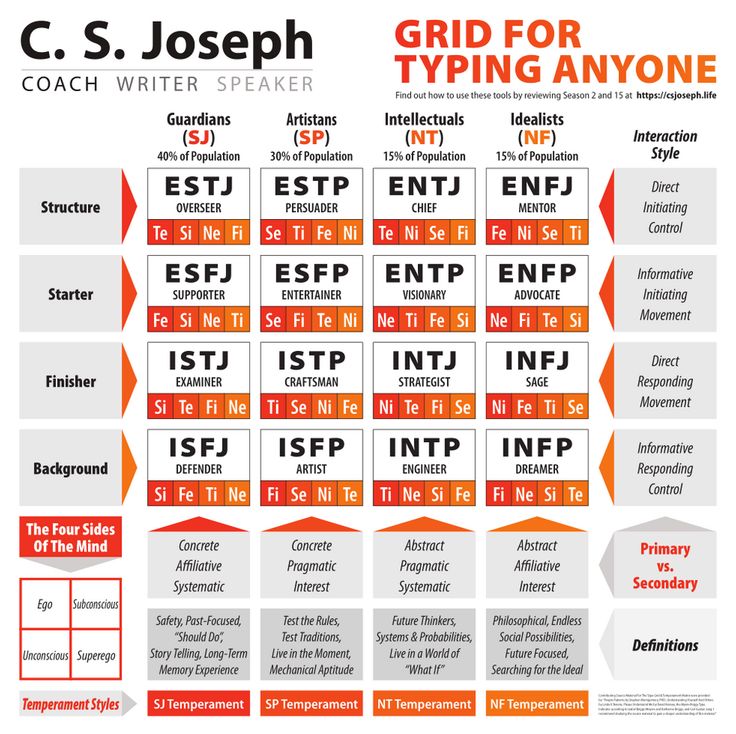
Commanders are unique in their insight. They can quickly figure out a problem and find an efficient solution. Whether it's a slow workflow or a lack of a schedule, ENTJs can find a way to transform chaos into harmony to suit their needs. Moreover, the Commander can easily maintain order for a long time.
INTJ - "Strategist"
🌍 How much in the world: 1-4%
⭐ How much in Russia: 6.66%
Top 3 countries with the most Strategists: Algeria (8.96%), Syria (8.23%), Georgia (7.79%).
Top 3 countries with the least number of Strategists: Northern Mariana Islands (1.65%), Bhutan (1.90%), Brunei (2.02%).
The first introverts on our list who combine a penchant for being a nerd with an excellent problem solver. Yes, they keep a lot in themselves, but this does not prevent them from showing themselves perfectly in work or study.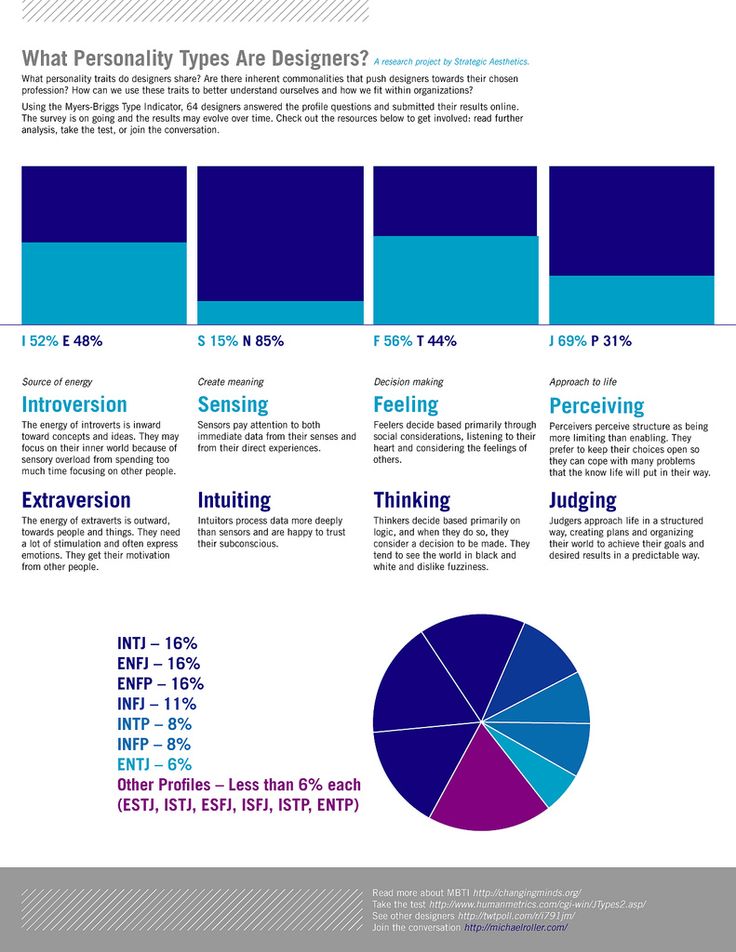 INTJ will never say something just like that, and he is only interested in a conversation when topics that are really interesting to him are raised. And they can’t stand stupid actions and lack of motivation.
INTJ will never say something just like that, and he is only interested in a conversation when topics that are really interesting to him are raised. And they can’t stand stupid actions and lack of motivation.
Strategists stand out from the crowd with a sense of the future and where it will lead humanity. They can predict the development of a particular industry, and very accurately. They use this ability to develop a strategy (the name of the type, you understand) that will help them put what they "see" into action. They say about such people that they are destined to accomplish great things.
INTP - "Scientist"
🌍 Share in the world: 3-5%
⭐ Share in Russia: 12.52%
Top 3 countries with the highest number of Scientists: Algeria (14.10%), Morocco (12.97%), Lithuania (12.74%) .
Top 3 countries with the least number of Scientists: Haiti (3. 41%), Fiji (3.72%), Cameroon (3.78%).
41%), Fiji (3.72%), Cameroon (3.78%).
Intuitive thinkers, Scientists are ways to go into themselves headlong, but at the same time it is easy to adapt to changes around and adapt flexibly to the conditions put forward by them. They like to question everything, but this is due to the fact that Scientists love to learn everything new and study the incomprehensible. At the same time, INTPs find it difficult to adapt to working in a group, therefore they find ways to remain independent.
The Scientists superpower is the ability to analyze a hopeless situation without panicking. Where others give up, the Scientist systematizes everything, scatters it and finds a way to fix everything or turn it into a positive. The more complex, the better, INTP will be even more interesting to dig and think. The solution to the problem from the Scientist can be striking in its novelty and simplicity. Everyone would like to get such a skill!
INFJ — "Activist"
🌍 World share: 2%
⭐ Share in Russia: 5.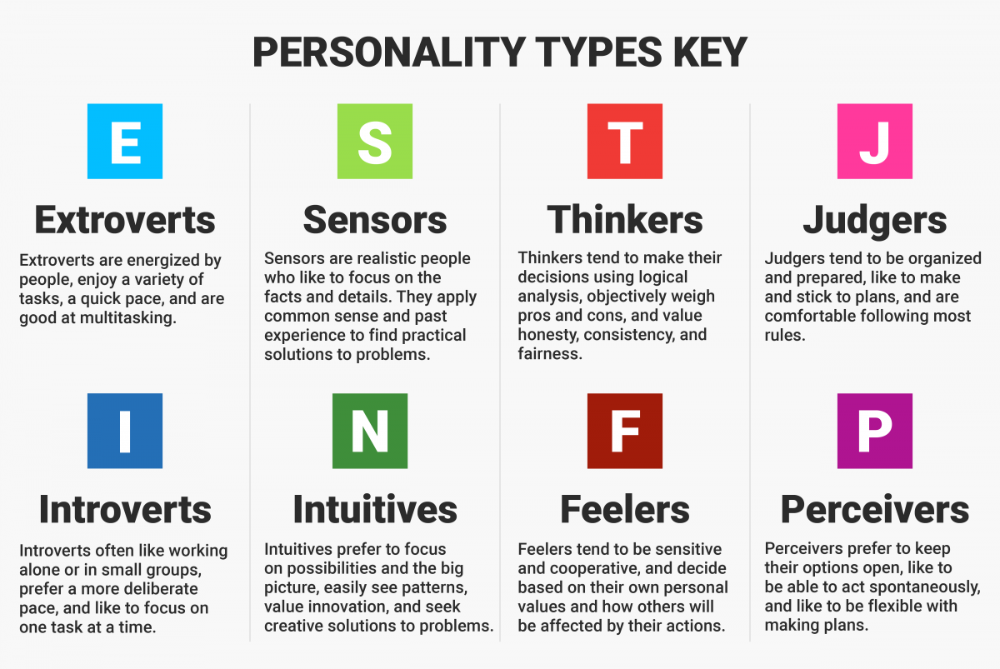 82%
82%
%), Puerto Rico (9.73%).
Top 3 countries with the least number of Activists: Afghanistan (4.63%), Kyrgyzstan (4.75%), Uzbekistan (4.90%).
Well, finally, we got to the rarest type of personality in the world - the Activist. Finding it, calculating it, finding out is quite difficult: these introverts blend in perfectly with the crowd, such is their strategy and the way of the samurai. They can easily pretend to be extroverts in an unfamiliar company if they see it as a benefit. Only at home, the Activist will allow himself to be a real introvert, because only those close to him fully and completely know about their features.
Not without reason did we mention the ease with which Activists can blend in with the crowd. The fact is that this gift from above helps INFJ easily put himself in the place of other people , play the situation in different ways, looking for the best scenario. Yes, it is very difficult for someone to see and understand both sides of the conflict, but Activists are ideal negotiators, so they feel great.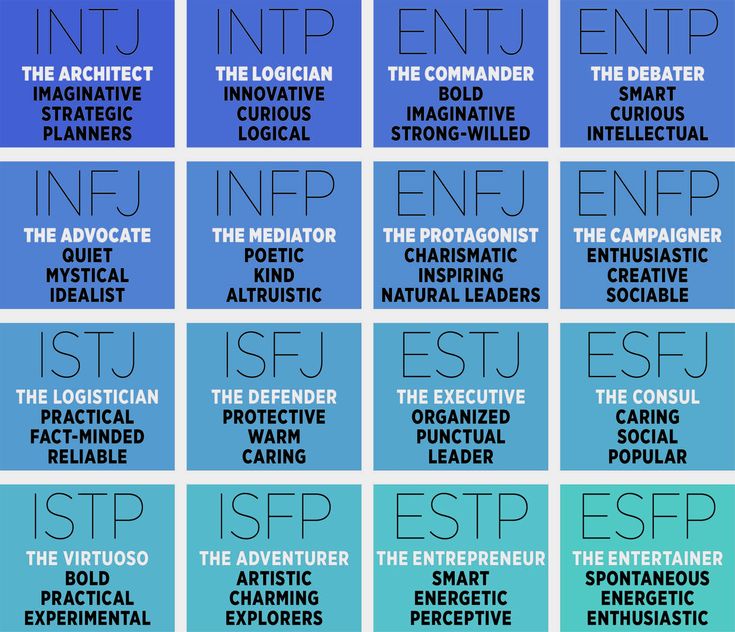 The main thing for them is to keep the peace.
The main thing for them is to keep the peace.
Nastya Baskakova
Tags
- personality types
- character
Personality types | 16Personalities
Analysts
Strategist
INTJ-A / INTJ-T
Imaginative, strategic thinkers with a plan for all occasions.
Scientist
INTP-A / INTP-T
Creative inventors, with a strong belief in the power of knowledge.
Commander
ENTJ-A / ENTJ-T
Brave, resourceful and strong-willed leaders who always find a way - or make a way.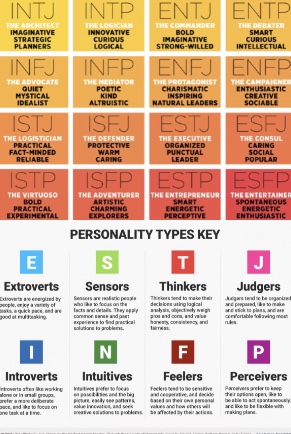
Debater
ENTP-A / ENTP-T
Smart and curious thinkers who never turn down an intellectual challenge.
Diplomats
Activist
INFJ-A / INFJ-T
Quiet and mystical, but inspiring and relentless idealists.
Intermediary
INFP-A / INFP-T
Poetic, kind and altruistic personalities, always ready to stand up for a good cause.
Trainer
ENFJ-A / ENFJ-T
Charismatic and inspiring leaders who captivate their listeners.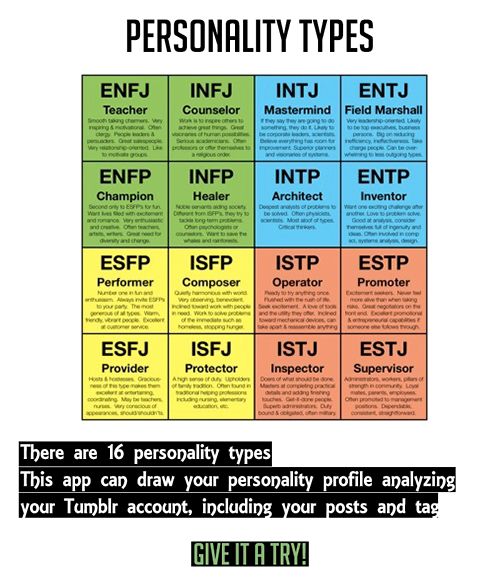
Wrestler
ENFP-A / ENFP-T
Enthusiasts, creative and sociable free minds who always find a reason to smile.
Guardians
Administrator
ISTJ-A / ISTJ-T
Practical and factual people whose reliability is unshakable.
Protector
ISFJ-A / ISFJ-T
Very responsible and kind protectors, always ready to protect their loved ones.
Manager
ESTJ-A / ESTJ-T
Excellent administrators, unsurpassed specialists in process and people management.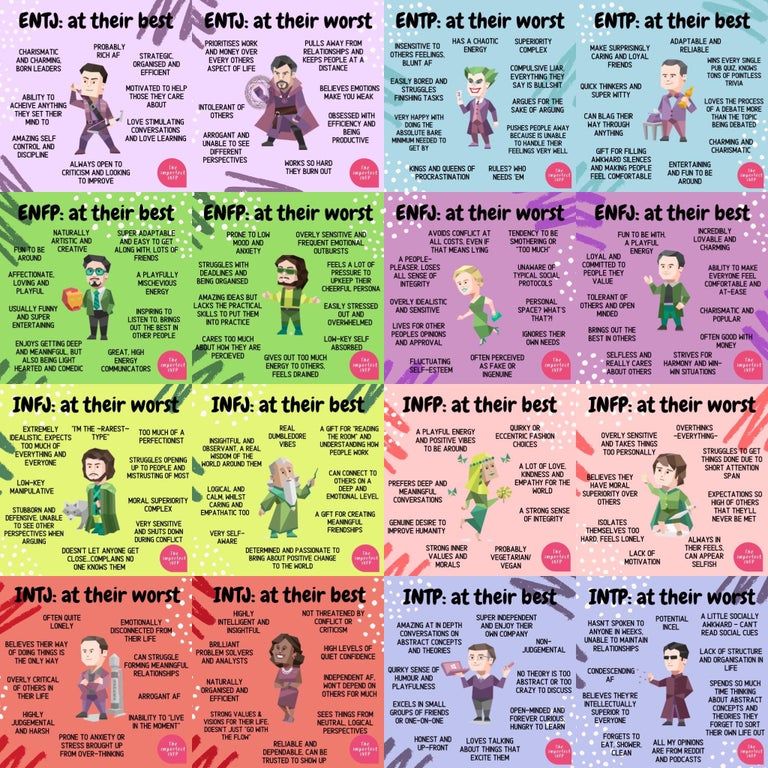
Consul
ESFJ-A / ESFJ-T
Extremely caring, sociable and popular people, always ready to help.
Seekers
Virtuoso
ISTP-A / ISTP-T
Brave and practical experimenters, masters of all kinds of techniques and tools.
Artist
ISFP-A / ISFP-T
Flexible and charming artists, always ready to explore and experience something new.
Dealer
ESTP-A / ESTP-T
Intelligent, energetic and very receptive people who truly enjoy risk.